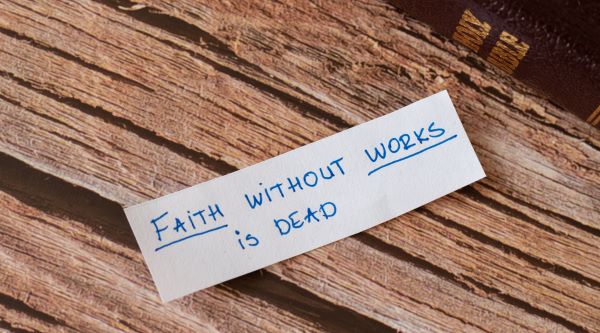Law Keepers or…?
By Jim Huskins
McDowell County
Is God’s Law an impossible burden? Is it too difficult to follow? The Church has taught this idea for so long that no one recalls a counter perspective. The “impossible law doctrine” is based on popular misinterpretations of some of Paul’s teachings and a few passages in Acts. One supposed proof text is Peter’s comments to the Jerusalem Council in Acts 15:10: “Why are you putting God to the test by placing a yoke on the neck of the disciples that neither our fathers nor we have been able to bear?”
The group whose demands provoked this Council insisted that keeping the law is necessary for salvation. The leaders of the Mother Church in Jerusalem affirmed that salvation is a gift of God by grace through faith. Speaking on behalf of the Council, Peter makes it clear that keeping the law is not required for salvation. It is absurd, however, to conclude that Peter refers to Torah as an impossible burden.
To do so would be to claim that God delivered His Chosen People from slavery in Egypt and immediately placed them under a different sort of bondage. Psalm 19:7 says that Torah is perfect and restorative. The same chapter also describes Torah as: sure, right, pure, and clean. Romans 7:12 says, “The law (Torah) is holy, and the commandment is holy and righteous and good.” The longest chapter in the Bible, Psalm 119, is an extended hymn of praise for the benefits of the Torah. Nowhere does the Bible claim that Torah is a burden. The Church takes the position that Jesus died so that believers could be “delivered” from what they view as an insurmountable barrier between God and man.
What Peter condemned before the Jerusalem Council was the man-made regulations Jewish leaders had long imposed on people wanting to lead Godly lives. Jesus addressed these made-up rules in Mark 7:8, “You leave the commandment of God and hold to the tradition of men.” The Judaizers of Acts 15 wanted more than for followers of Jesus to be law keepers. They also wanted believers to comply with the vast body of Jewish tradition contained in the Mishnah and the Talmud. Peter and the other leaders of the Jerusalem Church opposed this foolishness.
The rest of the findings of the Jerusalem Council were articulated by James the brother of Jesus. He gives the famous four requirements in Acts 15:20. New Believers should abstain from all forms of idol worship. They should avoid sexual immorality. They should not consume meat from any animal that had been strangled. They should not consume blood.
Christians are taught that these are the only aspects of the law that God expects His followers to keep. If that is the case, then murder, slander, bribery, human trafficking, theft, and a host of other actions that the Bible defines as “sin” are acceptable. This is ridiculous. In a culture steeped in pagan worship—which included ritual sacrifice and temple prostitution—these four items were a starting point for new believers. All four requirements are from The Law.
The only way to conclude that Acts 15 is a rejection of The Law is to stop reading at verse 20. Verse 21 says, “For from ancient generations Moses has had in every city those who proclaim him, for he is read every Sabbath in the synagogues.” After giving new converts the starting point for their conversion from paganism to following God, James tells those new believers that they need to be in Synagogue every Sabbath so they can learn the rest of the Law of Moses. That is the way to lead lives that please God. Both Peter and James teach in their Epistles that followers of Jesus should be law keepers.
So does Paul. Everyone who teaches that Christians are exempt from keeping God’s Law loves to quote the Book of Galatians. The problem is that they cite only parts of the book. In Galatians 5:19-21, Paul presents a list of actions that he calls “works of the flesh.” Each of these behaviors is a violation of the Torah. Paul states that people who do these things, “will not inherit the kingdom of God.” Paul can’t abolish The Law early in Galatians and insist later that violations of The Law will keep believers out of the Kingdom. Paul taught believers to be law keepers. Acts 21:24, Acts 25:8, and Acts 28:17 all insist that Paul was a law keeper all of his life.
The most significant encouragement for keeping God’s Law is the teaching and example of Jesus. He calls us from sin to righteousness. 1 John 3:4 says that sin is breaking the law. Righteousness is presented in Scripture as a core attribute of the Holy God. He can do no wrong. He gave us His Law to show us how we can reflect His life. Deuteronomy 6:25 presents this summary, “And it will be righteousness for us, if we are careful to do all this commandment before the LORD our God, as he has commanded us.” Jesus said that blessings accrue to those who “hunger and thirst after righteousness.”
Every believer is convinced that Jesus is not talking about them in Matthew 7:21-23. He prophesies that many will approach Him on Judgment Day insisting that they are due eternal life because they lived “religious lives.” They prophesied and cast out demons and did mighty works in His name. He responds that they should instead have done the will of His Father. That will is that we live according to God’s instructions—The Law. His final word is, “Depart from me you law breakers.”
The choice is ours. Salvation is by grace through faith. Living for Christ, however, comes with responsibility. We either cultivate a hunger and thirst for righteousness, or we willfully violate God’s Law. All of us are either law keepers, or we are lawbreakers.
__________________________________________________
Jim & Beverly Huskins are members of Obedient Heart Fellowship in McDowell County. Beginning July 2, 2022 Obedient Heart Fellowship will meet at 10:00 Each Sabbath (Seventh Day) in space graciously shared by New Covenant Church in Christ. 2460 US 221 Business N. In Marion, NC. Call for info. 828-460-7913. You can read more good Christian news from Jim HERE.
__________________________________________________







